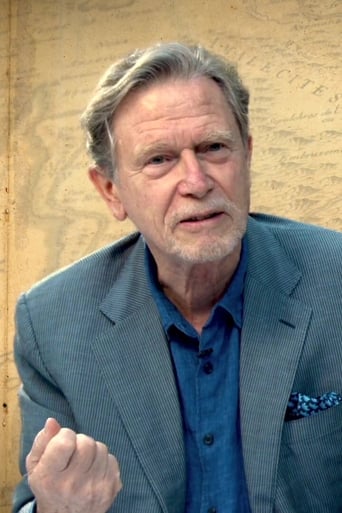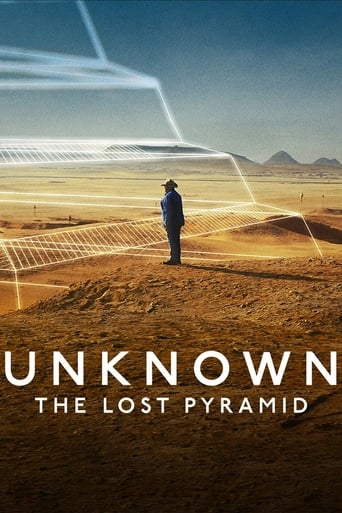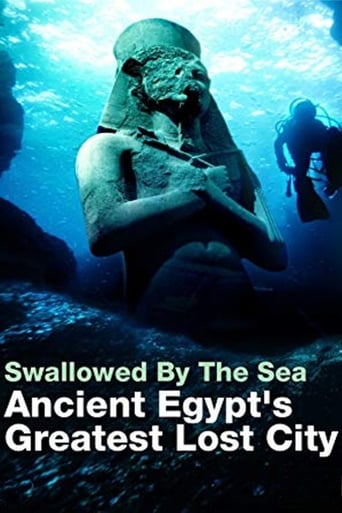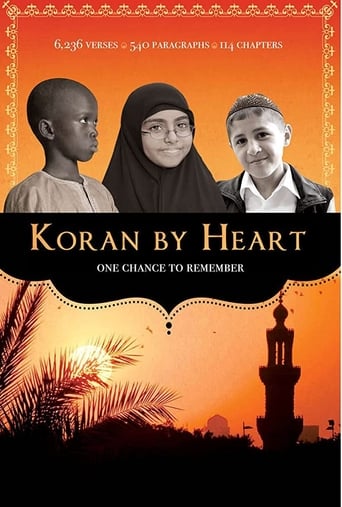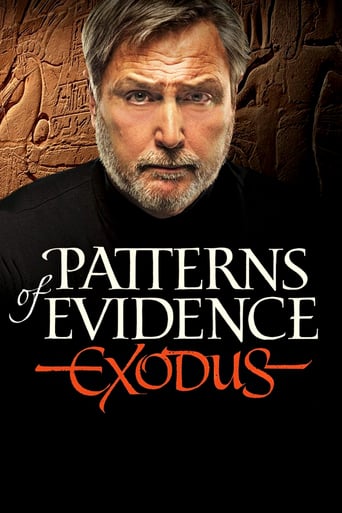
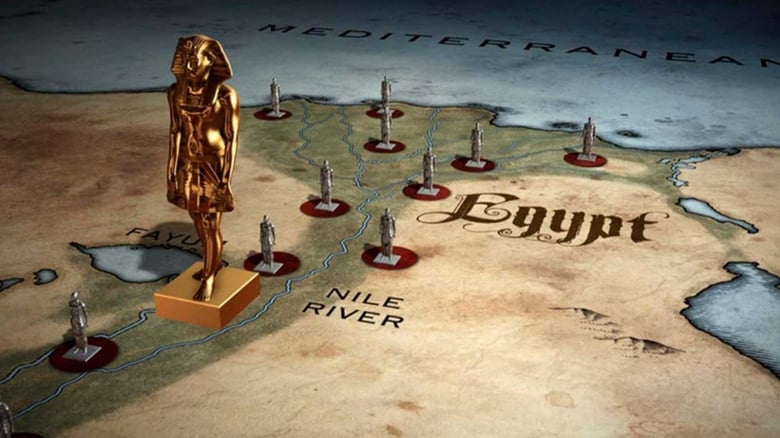
Patterns of Evidence: The Exodus (2014)
A debate rages over the credibility of the Bible. Most archaeologists today have concluded that there's no evidence that the Exodus of Israelite slaves from Egypt ever happened. Filmmaker Timothy Mahoney faces a crisis of faith: "Is this foundation event of the Bible really just a myth?" He embarks on a 12-year journey around the world to search for answers. Patterns of Evidence: The Exodus unlocks the mystery of this ancient saga, combining a scientific investigation with a retelling of the Exodus story to reveal an amazing pattern of evidence matching the biblical account that may challenge our understanding of history. It features stunning animations, narration by Kevin Sorbo (God's not dead, Hercules: The Legendary Journey), interviews with leading archaeologists such as Israel Finkelstein, Kent Weeks, and David Rohl, and guest appearances by Israel's Benjamin Netanyahu and Shimon Peres.
Watch Trailer
Cast


Similar titles
Reviews
I'm so tired of people who say it about scientists that hold currently unconventional point of view. Don't forget that you can be biased in many different ways. You can be biased because of your religious beliefs as likely as you can be biased by mainstream point of view or other ideas. In fact, it's easier to become biased by statements the majority of people around you believe in. There are many ideologies and systems of beliefs that are not religious. Atheist can have a system of beliefs or presumtions. All of us do because it's a part of being a human and being raised and socialized in society that is already influenced by different ideas. Someone truly unbiased and open minded is open to any evidence and point of view. It's really annoying to witness that as soon as people hear something that goes against current conventional beliefs they say it's ''biased'' and how ''logical'' and ''unbiased'' they and people who have the same point of view as they do are. It's so ironic because at least 90% of these self-proclaimed logical and reasonable couch ''scientists'' didn't do a real scientific research of their own. They just watched the documentary and maybe googled some papers that support conventional point of view for their convirmation bias at best. Ideal scientists are supposed to be humble and only observe the evidences. They don't state anything with 100% guarantee. They shouldn't rely too much and be so influenced by current conventional beliefs even in scientific world to be considered more credible. This is more of a human psychology thing and it's about biases too.
First off, I am not a big fan of documentaries. I have never been. This is the first one I have seen that gave some really convincing evidence and it was well researched. The guy who did the documentary was non-biased while doing this research. It took him 12 years! What was amazing, he researched the patterns between between the events that happened in the bible and Egypt's history. The things he found was really intriguing.Don't listen to the other people here that are giving bad reviews, they say that there is no evidence when in reality, there is plenty of evidence that is in the video. It's almost as if they watched the video and picked out bits and pieces without listening to the whole movie which would have answered the questions they had. One person complained that *spoiler alert* the statue of Joseph was just a 3d version made on the computer. However, they showed the 3d version of what it would have looked like back when it was made and then they showed the actual statue.My advice is to go into it with an open mind and let the evidence speak for itself. Then go out and research yourself if you want.I really enjoyed this movie and would watch it again.
I found Patterns of Evidence:The Exodus simply fascinating. It was well produced with a balanced analysis of the subject. It allowed each expert to explain their views freely and completely. This approach caused me to think beyond the box and ask my own questions. I now want to learn more about all of it. One of the experts at the center of it all is David Rolh. I hope to get and study his new book, "Exodus - Myth or History?". The tension presented by the dating controversy made the film very thoughtful. And as it progressed it becomes more and more compelling. Not just a bunch of dried up bones and clay pots but real life people that lived thousands of years ago that are at the center of our human story. Showing a bit of what they were like and what they thought. That's why I say it was not at all boring. I wanted to watch it over and over again and ran to my computer to look things up. I believe when a movie makes one curious it delivers something far greater and rewarding then simply entertaining us. Watch it you wouldn't regret it!!
This documentary provides astounding evidence of the events described in the book of Exodus, as well as key events in Genesis. Key events substantiated include:The existence of Joseph: -A canal which bears his name to this day which was a major achievement of agricultural planning and engineering; -A palatial residence in Goshen, belonging to a high ranking Egyptian official, built over a large Syrian-style home, in a district inhabited by Asiatic/Semitic people; -Joseph's tomb: adjacent to the palatial home, topped with a pyramid, surrounded by 11 other tombs in the same complex. The "Joseph tomb" features architecture reserved for pharaohs, queens, and other extremely high ranking Egyptian officials, contains no Egyptian religious objects, but does have a larger-than-life statue of a man who is portrayed as a northerner/Semitic man with distinct hairstyle and clothing, including the painted remnants of a "coat of many colors." The existence of a large population of Semitic persons in Egypt, populating the Delta region as the Bible specifies, apparently authorized directly by the pharaoh and/or his administration, comprising a distinct Semitic material culture, presence of herd animals in abundance (shepherd culture), which multiplied rapidly and was initially characterized by prosperity.Descent of Semitic population into poverty, impoverishment and short life expectancy, consistent with forced servitude.The occurrence of the Biblical plagues in Egypt, characterized by the sudden decline in Egypt's ability to defend itself, culminating in an effortless takeover by the "Hyksos" or "shepherd kings." An Egyptian document named the Ipuwer Papyrus details, with starting convergence to the Biblical account, a time in which Egypt suffered terrible plagues at the hands of "God" (singular), including thirst due to the Nile becoming "as blood," hunger and destitution in every social class in Egypt, death in every home, lamentation throughout the entire land, AND slaves plundering their former masters, with gold and jewels being worn around the necks of female slaves.Mahoney then cites archaeological evidence for the conquest of Canaan, in which all the cities claimed to have been destroyed in the book of Joshua, were in fact destroyed in the same exact manner. One striking piece of evidence is a tablet recovered from the ruins of Hazor, which references a king named Jabin--the exact name attributed to the king of Hazor (Jaban) by the book of Exodus! Other amazing correlations are found in the details of the destruction of the city of Jericho.All of this evidence taken in sum adds up to an exhaustively evidenced and coherent picture of major events described in Genesis, Exodus and the book of Joshua. The evidence is extremely compelling. The biggest impediment to a complete corroboration of the Biblical accounts is the discrepancies in dating that have plagued modern archaeological attempts to harmonize these events. These issues are complex and knotty, and well over the heads of most viewers, not to mention, very time-consuming to survey. In a rather understated way, Mahoney suggests that his own position is to agree with researchers like David Rohl that what is needed is a radical reassessment of Egyptian chronology. In my own reading and that of my husband, this view is well founded. Mahoney's goal at the end, it seems to me, is not to champion his own view of the harmonization of biblical accounts, history, and chronology, but to reveal the depth of archaeological evidence for the Exodus, give a brief introduction to varying views on how and where to place this event chronologically, and hope that his film will stimulate further interest, awareness and scholarship on the issue. I personally support, to my current knowledge on the subject, the redating route. To read more on this, I would recommend the works of Emmanuel Velikovsky: Ramses II and His Time (brilliantly illustrates a lot of the absurdities of conventional Egyptian chronology and dating) and Peoples of the Sea, in which he probes the question of who the Hyksos were. Another great work on the subject of chronological reassessment is Centuries of Darkness by Peter James.To conclude, I was highly impressed with this film and I can only hope Mahoney will direct a follow-up or even a series of films further probing issues of dating and other side issues of the Exodus. The end of the film was a bit disappointing just because of the lingering uncertainty as to dating with which Mahoney concluded, but I believe this was a very careful and reasonable tone to take with the subject matter. His main points were that there is a plethora of evidence archaeologically for these events occurring as described and that there are many and strong reasons to reassess conventional scholarship in terms of dating these events and even the wider chronologies of Egypt and the Near East. The first point was illustrated very brilliantly and persuasively; the second, I felt, a little less so, mostly due, I believe, to the heady nature of the evidence there and the lack of time to adequately cover such a subject. If this intrigues you, do your own reading! I also highly recommend the online articles of scholar Alan Montgomery, who has done absolutely brilliant work on Biblical, Egyptian and Near Eastern chronology. His view is that Kenyon's Jericho date of 1550 is indeed valid and that that is when the Conquest occurred, following a 1590 Exodus.I am thrilled that this documentary was produced and fervently hope that it will spark further debate, scholarship, and confidence on the part of believers of the Biblical accounts!




